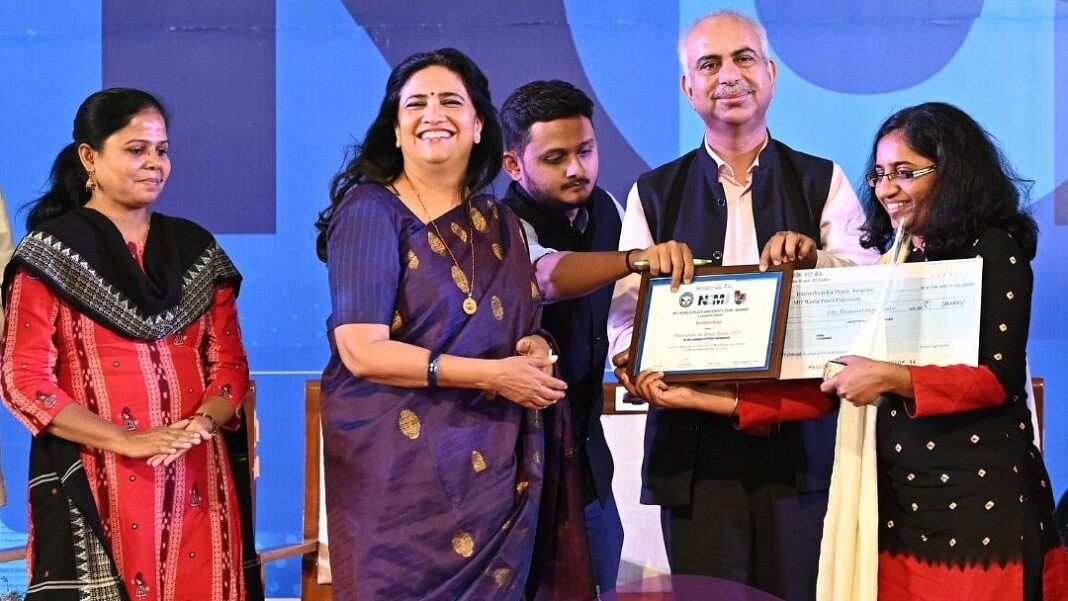: Asian News International (ANI) Editor News Smita Prakash on Thursday (November 10) said that social media is amplifying noise and annoyance and the only people getting nervous due to this are those who are ‘embedded in the system’. She was speaking during the inaugural session of the 4th National Conference on Media and Journalism (NCMJ) organised by MIT World Peace University. “Change means noise and disruption and everything is amplified by social media.
This disruption is making people nervous and they fear change,” she said while addressing students of mass media and journalism at the MIT World Peace University’s School of Media & Communication. MIT WPU President Prof Dr Vishwanath D Karad attended the session through a video link. Along with him, MIT WPU Executive President Rahul V.
Karad, former Prasar Bharati CEO Jawahar Sircar, RK Laxman Museum Director Usha Laxman, Political commentator Rasheed Kidwai, Pune Union of Working Journalists (PUWJ) President Swapnil Bapat and Prof. Dr. R.
M. Chitnis, Vice Chancellor, MIT WPU were present on the occasion. Ravleen Kaur, Independent Journalist, Down to Earth (Print), Sushil Kumar Mohapatra, Senior Editor, NDTV (Broadcast), and Neetu Singh, Independent Journalist, Gaon Connection (Digital) were conferred upon the ‘Journalism for Peace’ award at the hands of dignitaries.
Smita Prakash said, “There is a multiplicity of platforms today. Journalists are being fact-checked by the youth and hence we need to understand humility. Media is often blamed for spreading hate, but is it really media doing it or it is the reflection of the society? Recent incidents have highlighted the importance of journalists getting legal training.
Also, the foreign media has a biased view while reporting on India. Young and nationalist journalists could present stories to the world from an Indian perspective. ” Swapnil Bapat said, “Credibility, Revenue and Technology are the main challenges before journalists.
We must face them and overcome them. Discussion and dialogue on an individual and ideological level will help journalism further the cause of peace in society. ” Jawahar Sircar said, “Online and digital media has emerged as the biggest player in the media industry today.
The Internet is inevitable and connectivity has become equivalent to necessities like roti, kapda and makaan for citizens. OTT is still unregulated and the government is trying to bring it under the ambit of telecom laws. Complete networking of data has turned out to be a reality and hence microtargeting has become a threat.
However, excessive linkages without checks will put us in problem. Whether web 3. 0 or metaverse and 5G technology will change the future course of media, is what we need to look out for.
” Rasheed Kidwai appealed students to understand, as media practitioners, the process, ownership, and structure of media. While Vishwanath D Karad said, Religion is the way of life which helps you understand the role to promote the principle of peace. We are witnessing a new look of Mother India and the media should put that new look forward to society.
” Rahul Karad said, “Students should become problem solvers of the society. Journalism should reinstate the truth and students need to manifest what they want to become in their life. It will help them evolve in life.
” Lastly, Usha Laxman presented the audience with R. K. Laxman’s life and work.
.
From: freepressjournal
URL: https://www.freepressjournal.in/mumbai/journalism-for-peace-award-conferred-upon-ravleen-kaur-sushil-kumar-mohapatra-and-neetu-singh



